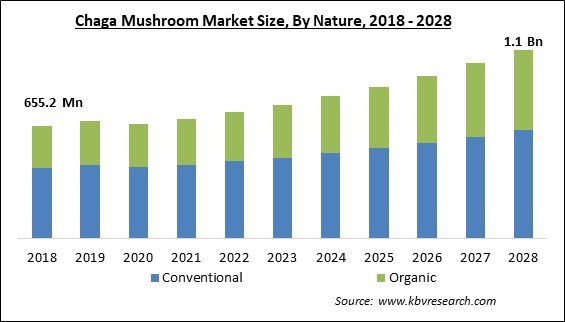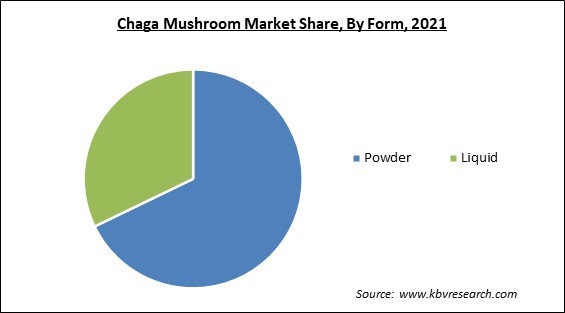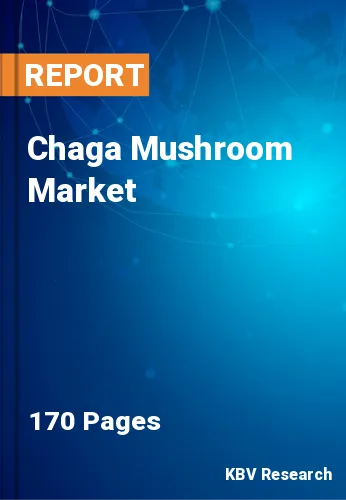The Global Chaga Mushroom Market size is expected to reach $1.1 billion by 2028, rising at a market growth of 6.9% CAGR during the forecast period.
Chaga mushroom (Inonotus obliquus) is a species of fungus that grows mainly on the bark of birch trees in cold areas, such as Northern Europe, Siberia, Russia, Korea, Northern Canada, and Alaska. Black mass, clinker polypore, birch canker polypore, cinder conk, and sterile conk trunk rot are other names for chaga (of birch). Conks, or woody growths, produced by chaga are around 10-15 inches (25-38 cm) in size and resemble clumps of burned charcoal.

Yet, a soft core with an orange tint may be seen within. Chaga has been used as a traditional medicine for millennia in Russia and other nations of Northern Europe, mainly to increase immunity and general health. Diabetes, several malignancies, and heart disease have all been treated with it.
Chaga was traditionally ground into a fine powder and used to make herbal tea. Chaga may be present in the tea or conjunction with other mushrooms, such as cordyceps. These days, it's also offered as a supplement in powder or capsules. It is said that taking chaga with warm or cold water may unleash its therapeutic effects. In addition, they have a low-calorie count, a high fiber content, and a wealth of antioxidants.
The tops of the mushrooms, which have an amorphous look and strongly resemble burnt charcoal, may be used to distinguish them. Wild Chaga takes three to five years to reach harvestable maturity, and many of the unusual substances it contains, such as betulin and betulinic acid, come from birch trees. If no birch trees are involved, like with a lab-grown procedure, none of these critical birch compounds will be present. No outer black layer, no melanin. Not to add that the end product will have a lot more grain than authentic Chaga canker since lab-grown Chaga contains myceliated grain. As a result, wild chaga has become more popular than chaga mushrooms bred in a lab.
The general populace will be more concerned with increasing their immunity levels which had a favorable effect on Chaga mushrooms because of their rise in demand due to the characteristics and health advantages. In addition, one of the most prevalent causes of veganism and knowledge of the health advantages of vegan cuisine is the rise in diseases brought on by junk food and meat consumption. So, after COVID-19, customers are seeking more vegan foods, such as Chaga mushrooms, that aid in immunity-building and viral defense. Thus, meals and supplements manufactured from Chaga mushrooms are in high customer demand and the market is anticipated to expand.
Chaga extract contains anti-tumor properties and has been influential in cancer treatment. Cancer is known to be one of the leading causes of death globally, and chaga mushroom may be helpful to prevent and perhaps cure cancer since it contains a small quantity of betulin and betulinic acid, which can kill cancer cells. As a result, Chaga mushrooms have gained popularity among pharmaceutical and healthcare makers that are focused on including these medicinal mushrooms for human welfare due to their strong medicinal properties. These factors are contributing to the growth of the chaga mushroom market.
Inonotus obliquus contains essential vitamins and minerals with many skincare advantages, such as zinc, copper, magnesium, selenium, and potassium. In addition, melanin-containing Chaga mushrooms are a natural anti-inflammatory and antioxidant that may be used as an ingredient, additive, or active agent in various skincare products. As a consequence, Chaga mushrooms are used by cosmetic companies for a variety of beauty care applications to provide defense against free radicals that cause cell damage, aging, and wrinkle development. Moreover, the bioflavonoids in chaga have astringent qualities that tighten the skin and provide further anti-wrinkle advantages. This supports the growth of the regional market.
Food that is typically soluble or insoluble naturally contains oxalates. Whereas soluble creates anions, negatively charged ions that go through the circulation, insoluble poses no health risks to the body. They are combined with free calcium to create calcium oxalate crystals, which may increase the likelihood of kidney stone development and injure the kidneys physically. In addition, soluble oxalates may diminish calcium levels, which are necessary for maintaining bone mass. For those who have problems with their bones, this becomes an issue. Hence, the high amount of oxalate in the Chaga mushrooms, which can cause kidney stones or other complications, is expected to hinder the market growth in the projected period.
Based on nature, the chaga mushroom market is segmented into organic and conventional. The conventional segment held the highest revenue share in the chaga mushroom market in 2021. This is due to the large quantity of Chaga mushrooms produced with the help of conventional farming. Insecticides eliminate bugs that could lay eggs in substrates, while fungicides are used to stop mold from forming on the substrate. Conventional mushroom producers also clean their mushroom sheds in between harvests using chemical disinfectants like chlorine.

On the basis of form, the chaga mushroom market is divided into powder and liquid. The liquid segment procured a substantial revenue share in the chaga mushroom market in 2021. This is because triple liquid extracts contain various full-spectrum compounds, including alcohol-soluble antioxidants like triterpenoids and Superoxide Dismutase [SOD] and water-soluble polysaccharides like beta-glucans. This ensures access to all the health benefits that mushrooms have to offer. Also, it has benefits which include slowing aging, lowering cholesterol, preventing and assisting in fighting cancer, boosting the immune system, controlling inflammation, and assisting in the battle against oxidative stress.
By end use, the chaga mushroom market is classified into pharmaceuticals, dietary supplements, food & beverage industry and cosmetics & personal care. The food & beverages industry segment registered the highest revenue share in the chaga mushroom market in 2021. This is due to the increased customer demand for healthful drinks such as chaga mushroom-based coffee, tea, and others. Also, the market is expected to grow due to the popularity of chaga mushroom-based goods such as dry supplements and other foods for balanced diets. The benefits of the Chaga mushroom and the increasing demand for plant-based products in the food and beverages sector will surge the segment's growth.
| Report Attribute | Details |
|---|---|
| Market size value in 2021 | USD 697.2 Million |
| Market size forecast in 2028 | USD 1.1 Billion |
| Base Year | 2021 |
| Historical Period | 2018 to 2020 |
| Forecast Period | 2022 to 2028 |
| Revenue Growth Rate | CAGR of 6.9% from 2022 to 2028 |
| Number of Pages | 170 |
| Number of Table | 339 |
| Report coverage | Market Trends, Revenue Estimation and Forecast, Segmentation Analysis, Regional and Country Breakdown, Companies Strategic Developments, Company Profiling |
| Segments covered | Nature, Form, End Use, Region |
| Country scope | US, Canada, Mexico, Germany, UK, France, Russia, Spain, Italy, China, Japan, India, South Korea, Singapore, Malaysia, Brazil, Argentina, UAE, Saudi Arabia, South Africa, Nigeria |
| Growth Drivers |
|
| Restraints |
|
Region-wise, the chaga mushroom market is analyzed across North America, Europe, Asia Pacific, and LAMEA. The Europe region witnessed the largest revenue share in the chaga mushroom market in 2021. This is because of the growing awareness of chaga's medicinal benefits and the acceptance of Chaga tea. The region is known to consume a significant amount of Chaga mushrooms. Additionally, due to the region's high output of Chaga mushrooms, Europe accounts for a large amount of the world's production of wild chaga mushrooms. These factors are anticipated to aid the market growth in the Europe region.
Free Valuable Insights: Global Chaga Mushroom Market size to reach USD 1.1 Billion by 2028
The market research report covers the analysis of key stake holders of the market. Key companies profiled in the report include Naturalin Bio-Resources Co., Ltd, Xiamen Boten Biological Technology Co., Ltd., Om Mushroom Superfood, Annanda Chaga Mushrooms, Touchwood Mushrooms, Hangzhou Muhua Bio-Tech Co., Ltd, White Mountain Mushrooms, LLC, Baikal Herbs Ltd and Sayan Health, Inc.
By Nature
By Form
By End Use
By Geography
The global Chaga Mushroom Market size is expected to reach $1.1 billion by 2028.
Application in skin care products are driving the market in coming years, however, High amounts of oxalate restraints the growth of the market.
Naturalin Bio-Resources Co., Ltd, Xiamen Boten Biological Technology Co., Ltd., Om Mushroom Superfood, Annanda Chaga Mushrooms, Touchwood Mushrooms, Hangzhou Muhua Bio-Tech Co., Ltd, White Mountain Mushrooms, LLC, Baikal Herbs Ltd and Sayan Health, Inc.
The expected CAGR of the Chaga Mushroom Market is 6.9% from 2022 to 2028.
The Powder segment avcquired maximum revenue share in the Global Chaga Mushroom Market by Form in 2021 thereby, achieving a market value of $715.6 Million by 2028.
The Europe market dominated the Global Chaga Mushroom Market by Region in 2021, and would continue to be a dominant market till 2028; thereby, achieving a market value of $387.1 Million by 2028.
Our team of dedicated experts can provide you with attractive expansion opportunities for your business.

